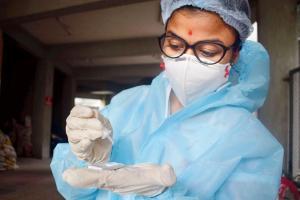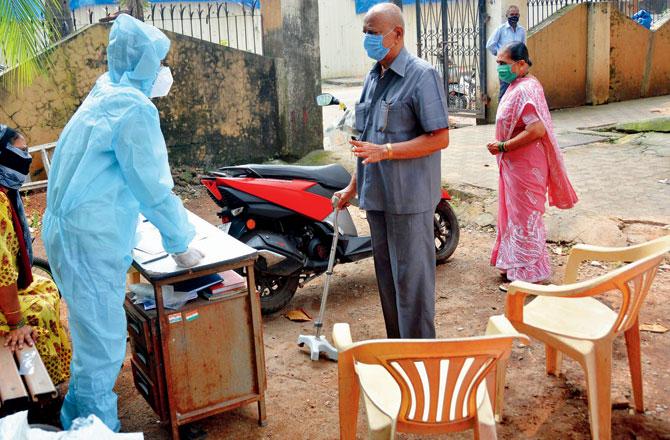Medical professionals, scientists rubbish claims of underreporting in India by medical journal, suggest robust research set-up to analyse real delays

Civic staff conduct antigen tests at Dadar. Pic/Ashish Raje
After India was accused of downplaying the number of COVID-19 infected by international medical journals and web portals, medical professionals and health scientists in the country have rubbished the claims saying there can never be fool-proof tracking of public at large."
This, experts, say is because a person who tests negative may get infected a few days later. Also, had screening in other countries like the UK and USA been accurate, they would have been able to contain the spread too.
ADVERTISEMENT
Dr Wiqar Shaikh, senior allergy and asthma specialist, said, "A September 5 article in the Lancet accused India of lack of clarity and shortcomings in registration, testing practices and classification of COVID-19 deaths. The Lancet mentioned shortcomings in data surveillance, particularly because testing for COVID in India is lower than in other countries."

Experts say antigen tests, like the one being done in Kurla, may have led to the problem of false-negatives. Pic/Sayyed Sameer Abedi
Dr Shaikh added, "The portal Corona Tracker reported that there is an exponential increase in India's COVID cases and those requiring daily treatment and critical care. As per the portal Statista, India has conducted approximately 82 million tests, which translates to 64,000 tests per million people. The highest number of tests worldwide is in Israel (4.47 lakh tests per million), UK (4.21 lakh tests per million) and USA (3.70 lakh tests per million). India stands at the 22nd position. Based on this, it is claimed that India scores poorly."
Publications also mentioned shortage of testing kits, lack of testing facilities in rural and semi-rural areas as causes of under-reporting and suggested expanding facilities and a uniform RT-PCR test. They also advised properly documenting COVID deaths.
However, Dr Shaikh argued, "Until June, only government laboratories did COVID tests. Then private labs started testing and numbers increased. This explains the lesser number of tests."
"It may be argued that despite higher tests, Europe and the UK are experiencing a second wave. By and large, asymptomatic positive patients do not undergo further testing once the initial report is positive. Besides, a negative person could turn positive later. This is not considered in data collection. COVID-19 data world over is inaccurate and there needs to be a proper system to count deaths too," Dr Shaikh said.
'India follows guidelines'
Similar concerns were echoed by Dr Subhash Hira, professor of Global Health at University of Washington-Seattle, health advisor to several UN, Indian and African health agencies. He said, "Every country should strictly adhere to the principles, SOPs, and best practices of International Health Regulation (IHR) ratified in 2005 and revised in 2009 at the WHO General Health Assembly. It provides a framework for all 195 signing countries for pandemic control and reporting principles. I feel that the Lancet report's assertions are misplaced."
"I am surprised that the experts did not mention IHR which over-rides the state health autonomy in a global pandemic. Also, I am aware that most, if not all, Indian states and the union health ministry have been transparent in reporting of new COVID cases and deaths. Inadvertent delays should not be given a harsh connotation of 'under-reporting," said Dr Hira.
Dr Hira said, "India's Ministry of Health should positively counter harsh connotations and undertake 'operations research projects' in slower states to analyse real delays in reporting, if any. India and other developed countries are already paying for having sat on a 'slippery slope' for decades after repeated wakeup calls brought about by HIV/AIDS in 1980s, SARS in 2002, influenza in 1996, swine flu in 2005, Zika in 2009, and Ebola in 2014. India has announced a paradigm shift towards 'Atmanirbhar' and based on this, Indian scientists suggest that the PMO and MOH set-up a quality operations research programme."
Dr Ketan Vagholkar, professor of surgery at D Y Patil Medical College, said, "The unnecessary targeting of India is totally uncalled for. Despite a heterogeneous culture and a population of over 130 million, we have done exceedingly well in controlling the pandemic. Although in an Unlock phase, the numbers are decreasing."
Dr Vagholkar added, "Good protocols for diagnosis and treatment led to decrease in mortality as well. We should continue our way of working, and not pay any heed to the western journals or agencies."
Dr Vagholkar added, "There could have been a variation in international data due to a continuous change in testing protocols as advised by individual countries. Hence, there is a lack of uniformity in testing and data collection, one cannot accuse another country of inaccurate reporting. Our testing and treatment are much superior to developed nations'."
'Problem of false-negatives'
A senior vaccine expert from a reputable pharma company, said, "The crux of the issue is that in such data, around 25 per cent are false negative reports from antigen tests. This could be the group of actual infection spreaders. The recommended gold standard is the RT-PCR test. Unfortunately, it is not adhered to strictly, thereby raising ambiguity in all countries. Therefore, scientifically, it is irrational to link such data with the current evidence-based evaluation of COVID-19."
Also Read: Mumbai: Breathless, itchy, sweaty and foggy as COVID-19 masks remain issue for many
June
Month in which private labs started testing for COVID and cases increased
Keep scrolling to read more news
Catch up on all the latest Mumbai news, crime news, current affairs, and a complete guide from food to things to do and events across Mumbai. Also download the new mid-day Android and iOS apps to get latest updates.
Mid-Day is now on Telegram. Click here to join our channel (@middayinfomedialtd) and stay updated with the latest news
 Subscribe today by clicking the link and stay updated with the latest news!" Click here!
Subscribe today by clicking the link and stay updated with the latest news!" Click here!







